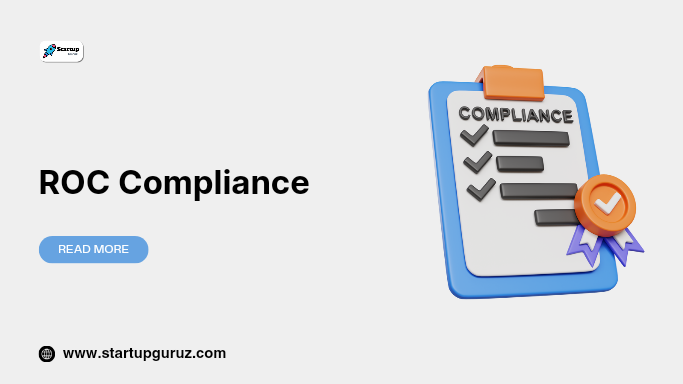ROC Compliance
1. Introduction to ROC Compliance
ROC (Registrar of Companies) compliance refers to the adherence of statutory requirements mandated by the Companies Act and other relevant regulations enforced by the ROC. It encompasses various administrative and regulatory obligations that companies must fulfill to maintain legal and financial transparency.

2. Importance of ROC Compliance
ROC compliance is crucial for:
- Ensuring corporate governance and accountability.
- Upholding transparency and integrity in business operations.
- Protecting the interests of stakeholders, including shareholders, creditors, and employees.
- Avoiding legal penalties, fines, and reputational damage associated with non-compliance.
3. Key Aspects of ROC Compliance
Key aspects of ROC compliance include:
- Filing of annual returns and financial statements.
- Maintenance of statutory registers and records.
- Holding of board meetings and general meetings as per regulatory timelines.
- Appointment and resignation of directors.
- Compliance with disclosure requirements for related party transactions and corporate governance norms.
4. Legal Framework for ROC Compliance
The legal framework for ROC compliance is primarily governed by the Companies Act, 2013, and rules and regulations issued by the Ministry of Corporate Affairs (MCA) and ROC. Other relevant laws and regulations, such as the Securities and Exchange Board of India (SEBI) regulations, may also apply depending on the nature and size of the company.
5. ROC Compliance Checklist
A ROC compliance checklist typically includes:
- Annual filings such as annual return, financial statements, and auditor’s report.
- Appointment and resignation of directors and key managerial personnel.
- Disclosure of significant events and transactions to the ROC.
- Maintenance of statutory registers and records.
- Compliance with corporate governance norms and disclosure requirements.
6. Common ROC Compliance Requirements
Common ROC compliance requirements include:
- Filing of annual return (Form MGT-7) containing company information, shareholding pattern, and details of directors and key managerial personnel.
- Submission of financial statements (Form AOC-4) including balance sheet, profit and loss account, and cash flow statement.
- Maintenance of statutory registers such as register of members, directors, and charges.
- Holding of board meetings, general meetings, and annual general meetings as per prescribed timelines.
7. Consequences of Non-Compliance
Non-compliance with ROC requirements can lead to:
- Imposition of penalties, fines, and legal sanctions by the ROC.
- Invalidation of transactions and resolutions passed by the company.
- Disqualification of directors or suspension of business operations.
- Reputational damage and loss of investor confidence.
- Legal proceedings initiated by regulatory authorities or aggrieved stakeholders.
8. Benefits of ROC Compliance
Benefits of ROC compliance include:
- Enhanced corporate governance and transparency.
- Improved access to capital markets and funding opportunities.
- Protection of shareholder interests and stakeholder confidence.
- Prevention of fraud, mismanagement, and financial irregularities.
- Strengthened regulatory compliance culture within the organization.
9. Challenges in Achieving ROC Compliance
Challenges in achieving ROC compliance may include:
- Complexity and frequent changes in regulatory requirements.
- Resource constraints and lack of expertise in compliance management.
- Inadequate systems and processes for record-keeping and reporting.
- Compliance fatigue or oversight due to competing business priorities.
- Compliance burden for small and medium-sized enterprises (SMEs) with limited resources.
10. FAQs on ROC Compliance
Q1: What is ROC compliance? A1: ROC compliance refers to adherence to statutory requirements mandated by the Companies Act and other relevant regulations enforced by the Registrar of Companies.
Q2: Who is responsible for ROC compliance? A2: The board of directors, company secretary, and designated compliance officers are responsible for ensuring ROC compliance within the organization.
Q3: What are the consequences of non-compliance with ROC requirements? A3: Non-compliance with ROC requirements can result in penalties, fines, legal sanctions, disqualification of directors, and reputational damage to the company.
Q4: How often do companies need to file annual returns and financial statements with the ROC? A4: Companies are required to file annual returns and financial statements with the ROC within prescribed timelines, typically within 30 days from the date of the annual general meeting.
Q5: What are the statutory registers that companies need to maintain for ROC compliance? A5: Statutory registers include registers of members, directors, charges, shareholding, and key managerial personnel, among others.
Q6: Can companies delegate ROC compliance responsibilities to third-party service providers? A6: Yes, companies can engage third-party professionals such as company secretaries, chartered accountants, and legal advisors to assist with ROC compliance.
Q7: Are there any exemptions or relaxations available for ROC compliance for certain types of companies? A7: Yes, certain categories of companies such as small companies, one-person companies, and dormant companies may be eligible for exemptions or relaxations in ROC compliance requirements.
Q8: How can companies ensure timely compliance with ROC requirements? A8: Companies can implement robust compliance management systems, establish internal controls and processes, conduct regular audits, and stay updated on regulatory changes.
Q9: What are the consequences of late filing or non-filing of annual returns and financial statements with the ROC? A9: Late filing or non-filing of annual returns and financial statements can attract penalties, fines, and legal sanctions, and may lead to disqualification of directors or suspension of business operations.
Q10: How can companies stay updated on changes in ROC compliance requirements? A10: Companies can subscribe to regulatory updates, consult with legal and compliance experts, attend seminars and workshops, and refer to official publications and websites of regulatory authorities.
11. Conclusion
ROC compliance is a fundamental aspect of corporate governance and regulatory compliance for companies operating in India. By understanding the legal framework, fulfilling statutory requirements, and adopting best practices, companies can enhance transparency, accountability, and trust among stakeholders. However, achieving and maintaining ROC compliance requires continuous effort, diligence, and investment in compliance management systems and resources. Stay informed, stay compliant, and navigate the complexities of ROC compliance with confidence to ensure the long-term sustainability and success of your business.